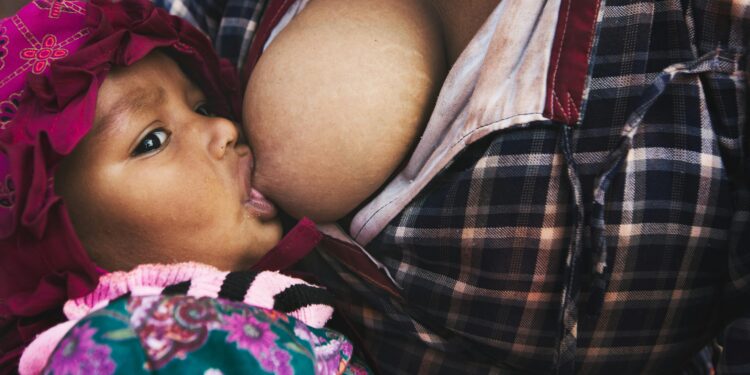New moms often face confusion about when their newborns have had enough to eat. Newborns have very small stomachs which can only hold a limited amount of milk or formula at a time, making it easy to overfeed them.
If caregivers don’t pay attention to when babies are hungry or full, they might give them too much milk or formula, which can make the baby uncomfortable or cause tummy problems. As a result, it’s important for moms to learn to recognize these signals so they can feed their baby just the right amount. In this article we’ll look at signs of overfeeding in newborn babies.

Common Signs of Overfeeding in Newborn Babies
1. Spitting Up/Vomiting: Babies often spit up a little milk or formula which is normal. However, if it happens a lot or they forcefully vomit after feeding, it might mean they’ve had too much to eat.
2. Gassiness and Discomfort: When babies are overfed, their digestive system might struggle to break down this excess milk. This process can cause gas buildup in their stomach, which can lead to discomfort in their abdomen. As a result, the baby becomes really cranky and uncomfortable.
3. Feeding Cues: Babies naturally show signs when they are hungry or full. But as a caregiver if you aren’t attentive, you might miss these signs. These signs include turning away from the bottle or breast, clenching their fists, or falling asleep during feeding.
4. Stool Changes: Overfeeding can cause babies to have more loose stools or even diarrhea because their tummies can’t handle all the extra food. When this happens, you need to gauge their next meal which should be smaller than the meal you gave them that caused the loose stool in the first place.
5. Excessive Crying: While crying is normal and a way for babies to communicate their needs, crying a lot after feeding could mean the baby’s tummy hurts from being fed too much. Remember the feeding cues babies display? All you need to do is be attentive, especially during mid feeding in order to catch the signs they make.
Are There Any Other Things to Consider When Feeding a Baby?
Yes, there is and the feeding method is one of them. There are two common feeding methods: breastfeeding and bottle-feeding. Babies who drink from bottles might be more likely to overeat because the milk comes out faster than from breastfeeding. This fast flow can make it easy for them to swallow more than they need. You need to watch how quickly your baby drinks from bottles and make sure to pace the feeding to match your baby’s natural pace.
Conclusion
Lastly, newborns don’t follow a strict schedule for feeding. They should be fed whenever they show signs of being hungry, like sucking on their hands or turning towards the bottle or breast.
Feeding babies when they are hungry helps them develop good eating habits and ensures they get enough food without being fed too much.

















